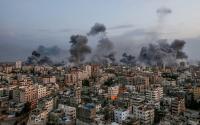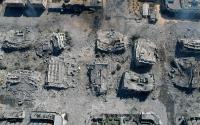War is only feasible because Iraq isn't a threat to the US
September 20, 2002The Guardian
Two images from northern Iraq in 1991 seem to me to bracket the possibilities of a new war to bring down Saddam Hussein. One is of a Kurdish fighter bringing his open palm up to his lips and softly blowing to demonstrate how Iraqi garrisons scattered like thistledown when the Kurds made their first moves against them. The soldiers vanished from their forts with hardly a shot fired, while the tribal militiamen long subsidised by Saddam went over to the rebels without exception.
The other is of the useless cloth masks which the wives and mothers of Suleimaniyah had made to protect their families, so pathetic in their fine workmanship, as if the seamstress's art could guard against poison gas.
One image suggests the likelihood that Saddam's troops, faced again with the combination of military intervention from the outside and rebellion within, will either run away or bargain for their lives. The same clandestine contacts with the enemy, which preceded the 1991 collapse, are going on again today, This time, however, the commanders trying to keep their options open are along the line of demarcation between Kurdish-held territory and Saddam's lands, or in the Shia-populated south.
There is little reason to doubt that even among the Sunni Arabs of the central part of the country real support for the regime is scant, because, as one Iraqi exile puts it: "There is hardly a family, a group or a tribe in the nation who Saddam has not hurt or humiliated." Saddam's regime, on this argument, just needs a push, but it is a push that can only come from outside and which could lead to an easy, perhaps an astonishingly easy, victory. Those who argue that change should only come from within forget all those Iraqis who tried and failed in the past, and who paid with their lives.
The other image - that of the masks - by contrast raises the prospect that Saddam in his extremity would use chemical, biological, or radiological weapons against the invading Americans and their Iraqi allies, or against the Israelis, or against the American or European homelands by using agents carrying suitcase bombs. Then, the easy conventional victory that might have been achieved would be hollow indeed. If the views of the former UN weapons inspector, Scott Ritter, are sound this danger may be remote, for they suggest that Saddam has little left in the way of weapons of mass destruction, and hardly any means of delivering what he has. But even if it is remote, it ought to be regarded as a factor of potentially decisive importance.
The odd thing here is that the more overwhelming the evidence is that Saddam has usable weapons of mass destruction, the less of a case there is for going to war, because even the the fiercest hawks would presumably agree that nothing would be worth the damage their use would cause. War becomes possible, but less justifiable in strict terms, the less likely it is that he has such weapons or could acquire them in a very short time. The illogicality of the debate on "evidence" is that wholly convincing data would rule out war, while merely indicative evidence that Saddam is struggling to maintain or restore his weapons programmes is determined in advance to be insufficient by many critics of American policy.
It is precisely because he is not now a real threat to the US, nor a real ally of al-Qaida, and nor, probably, in possession of usable weapons, that war is feasible. This is why it was shrewd of President Bush, at the UN, to make the issue not one of "proof" of possession, or of a threat to neighbours or to America, but of Iraq's refusal to abide by the bargain which the regime made with the international community in 1991, and of what this continuing refusal might bode for the future.
It is not sufficiently recognised that in going to the UN in the way he did Bush has genuinely transformed the situation. He has changed the issue and changed the context. As long as the US was pursuing Iraq on its own, the majority of other countries, including America's allies, could avoid engagement. The persistent pattern of the last decade over Iraq, long before the Bush administration came into office, has been of wilfulness on one side and irresponsibility on the other. America and Britain were isolated in policies which other nations were happy to point out were not producing either full Iraqi disarmament or a change of regime.
Yet these others offered no solutions of their own - except ending sanctions - which would relieve the suffering of ordinary Iraqis, but was also unconvincingly proposed as a means of bringing down Saddam. In other words, two countries followed an ineffective course which arguably penalised the Iraqi people without bringing the change that many of them undoubtedly craved, while other countries abdicated, denied, or fantasised.
Bush went to the UN because an attack on Iraq would be very difficult without a degree of support from other countries that has, until now, been signally lacking. But he also reminded the world body and its members of the dismal collective failure that Iraqi policy represents. He has thus concentrated minds on the question of how to deal with Saddam and Iraq in a way they have not been concentrated since the Gulf war, or its immediate aftermath. Following the Iraqi announcement of readiness to accept inspectors, the result will be a period of intense manoeuvring in which continuing American preparations for war will stiffen international diplomacy.
None of the countries concerned can afford to play the game in the way that it has been played in the past. If war cannot be avoided, countries will have to decide not what they think of the prospect of an attack but what they want to do about one under way, a very different thing. There is a simple truth about all risky undertakings which was expressed by a colleague. He said of an attack on Iraq: "If it works it will be a good idea, and if it doesn't it won't be." There goes the thistledown, but what about the gas masks?
If war can be avoided without compromising legitimate objectives, this is the time it can be done, when a united diplomacy could have more impact on Iraq than at any time this past 10 years. This is a moment when, for instance, the Carnegie Endowment's new proposals about providing inspectors in Iraq with on-call troops and police, so that they really would have complete freedom of movement and access, might have a chance of being accepted.
But there should be no illusions that any diplomatic solution will be acceptable that does not meet the twin objectives of making it impossible for Iraq to pursue weapons of mass destruction and making it more likely, through the effect of humiliation and demonstrated weakness, that Saddam will go.






